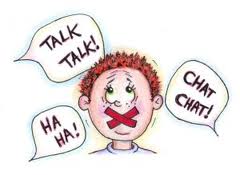Difference between revisions of "Kinds of Speech Disorders"
(→Selective Mutism) |
(→Selective Mutism) |
||
| Line 21: | Line 21: | ||
=='''Selective Mutism'''== | =='''Selective Mutism'''== | ||
It is a rare psychological mental disorder. Although capable of speaking and understanding the language, the person suffering from this disorder fail to speak in certain social situations when it is expected of them. It occurs before a child is 5 years old and is usually first noticed when the child starts school. | It is a rare psychological mental disorder. Although capable of speaking and understanding the language, the person suffering from this disorder fail to speak in certain social situations when it is expected of them. It occurs before a child is 5 years old and is usually first noticed when the child starts school. | ||
| + | |||
| + | [[File:Selective_mutism.jpg]] | ||
'''Symptoms''': | '''Symptoms''': | ||
Revision as of 04:55, 25 July 2010
Contents
Stuttering
This is a problem that creates problem while speaking fluently. There may be repetition of the first part of a word (as in wa-wa-wa-water) or hold a single sound for a long time (as in caaaaaaake) by the person.Getting out sounds together is sometimes troublesome for the people. The disorder is complex, and it can affect speech in many different ways.
Cluttering
This disorder also makes a person's speech difficult to understand. Cluttering also affects the fluency, or flow, of a person's speech.It is a language disorder. People suffering from this disease have difficulty in getting out what they want to say.They try to say what they are thinking, but it becomes disorganized while actually speaking. The speaker is sometimes not aware of the problem so the rhythm of speech may get jerky, rather than smooth.
Articulation disorders
These include a wide range of errors people can make when talking. Substituting a "w" for an "r" ("wabbit" for "rabbit"), omitting sounds ("cool" for "school"), or adding sounds to words ("pinanio" for "piano") are examples of articulation errors. Lisping refers to specific substitution involving the letters "s" and "z." A person who lisps replaces those sounds with "th."
Apraxia (dyspraxia)
It is a problem with motor coordination or motor planning which affects the speech. The movement of the muscles and structures necessary to form speech sounds into words become difficult for the person making him/her uncomfortable while speaking.
Dysarthria
Damage of the nerves and/or brain may lead to weakening or paralysis of speech muscles . Dysarthria can be the result of strokes, parkinsons disease,head or neck injuries, surgical accident, or cerebral palsy.
Selective Mutism
It is a rare psychological mental disorder. Although capable of speaking and understanding the language, the person suffering from this disorder fail to speak in certain social situations when it is expected of them. It occurs before a child is 5 years old and is usually first noticed when the child starts school.
Symptoms:
1.Consistent failure to speak in specific social situations despite speaking in other situations. 2.Not speaking interferes with school or work, or with social communication. 3.Lasts at least 1 month. 4.Failure to speak is not due to a lack of knowledge of, or comfort, with the spoken language required in the social situation. 5.Not due to a communication disorder (e.g., stuttering).
Children with selective mutism may also show:
Anxiety disorder (e.g., social phobia) Excessive shyness Fear of social embarrassment Social isolation and withdrawal
Treatment
Individual, behavioral, and family counseling should be provided. A two-pronged approach to treatment is recommended for children who are mute at school:
1.Individual psychotherapy can eliminate the general anxiety and to practice better communication skills; 2.A behavioral program at school to slowly shape increasingly appropriate communication.

